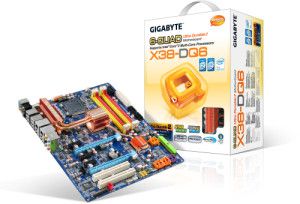From our front-page news:
According to DigiTimes, Intel's X48 chipset is right around the corner with a tentative Q1 2008 launch date. With X38 released just last Tuesday, it's questioned whether or not sales are going to prove lackluster because of X48's upcoming launch. As odd as it is to release a revised chipset mere months after a major release, I am doubtful it will hurt sales much, if at all.
Compared to P35, X38 brought a lot to the table, with PCI-E 2.0 and full Crossfire support, not to mention native 45nm support. As far as we are aware, X48 brings another FSB bump (1600MHz) and also native DDR3-1600 support, two things that X38 will likely see before X48 hits. X38 should do well, at least as far as enthusiasts are concerned. Good thing, since that's who the chipset was designed for.
<table align="center"><tbody><tr><td>
 </td></tr></tbody></table>
</td></tr></tbody></table>
However, sources from one first-tier maker claimed that it sees no danger of the X48 diluting demand for X38-based motherboards, noting that it has simply revised its product mix to feature X48 at the top-end, premium section of its lineup. Makers most likely to be affected by the new chipset are second-tier makers who have fewer resources with which to prepare for a new product launch in the shortened time, and those who have a less well managed channel, according to the sources.
Source: DigiTimes
Compared to P35, X38 brought a lot to the table, with PCI-E 2.0 and full Crossfire support, not to mention native 45nm support. As far as we are aware, X48 brings another FSB bump (1600MHz) and also native DDR3-1600 support, two things that X38 will likely see before X48 hits. X38 should do well, at least as far as enthusiasts are concerned. Good thing, since that's who the chipset was designed for.
<table align="center"><tbody><tr><td>

However, sources from one first-tier maker claimed that it sees no danger of the X48 diluting demand for X38-based motherboards, noting that it has simply revised its product mix to feature X48 at the top-end, premium section of its lineup. Makers most likely to be affected by the new chipset are second-tier makers who have fewer resources with which to prepare for a new product launch in the shortened time, and those who have a less well managed channel, according to the sources.
Source: DigiTimes
